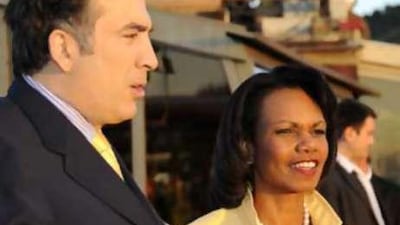TBILISI // The US Secretary of State Condoleezza Rice has called on Russia to help resolve tensions in Georgia's rebel regions rather than contributing to it and demanded an end to the violence there. Ms Rice, on a two-day visit to the former Soviet state to meet with the Georgian President Mikheil Saakashvili, said at a briefing in the Georgian capital of Tbilisi: "It (Russia) needs to be a part of resolving the problem and solving the problem and not contributing to it. "I have said it to the Russians publicly. I have said it privately.
"The violence needs to stop," said Ms Rice. "It is very important that all parties reject violence as an option. There must be a peaceful solution." She said she would seek higher level talks to seek a peace settlement in the breakaway regions of South Ossetia and Abkhazia. The two regions broke away from Tbilisi's rule after wars in the 1990s, but they have no international recognition. Russia, which has peacekeepers in the regions, says Tbilisi wants to use force to re-establish its control, and that the local populations do not want to be part of Georgia.
Ms Rice also advised the Georgian government to make sure opposition voices are represented in its political system, after its pro-Western leadership ? hailed by the US President George W Bush as a "beacon of democracy" ? tarnished its democratic credentials last year by using tear gas to break up opposition protest rallies and closed down a television station. "Democracy is absolutely necessary, not because human beings are perfect but because they are imperfect," she said.
"And because human beings are imperfect, no one has all the answers. And that means that there has to be room for many voices. Those many voices in a modern state need to have organised ways of expressing themselves. and its president "That can be through a free press. It can be through civil society. It can be through competitive elections and opposition. It can be through strong parliaments and it all has to be protected by an independent judiciary," Ms Rice added.
Georgia's main opposition coalition is boycotting parliament because they allege a parliamentary election in May was rigged to hand victory to Mr Saakashvili's supporters. International monitors said the election did not live up to Georgia's democratic potential and that they had verified cases of intimidation. Ms Rice also took the opportunity to fire a broadside at the Iran government after the country's Revolutionary Guards recently tested nine long and medium range missiles, one of which was the new version of the Shahab-3 missile with a claimed range of 2,000km, which puts Israel and US military bases stationed in the Middle East within reach. Ms Rice warned Tehran they should have no doubt about the US' commitment to defending its allies from possible attack.
"We are also sending a message to Iran that we will defend American interests and ... the interests of our allies. "We take very, very strongly our obligation to help our allies defend themselves and no one should be confused about that," she said. The US and European powers suspect Tehran of trying to develop a nuclear weapons under cover of its civilian atomic programme. Tehran denies this, saying its nuclear programme is exclusively for generating electricity.
The United States has said it will not rule out military action against Iran but says that it is committed to seeking a diplomatic solution to the nuclear row. *Reuters

